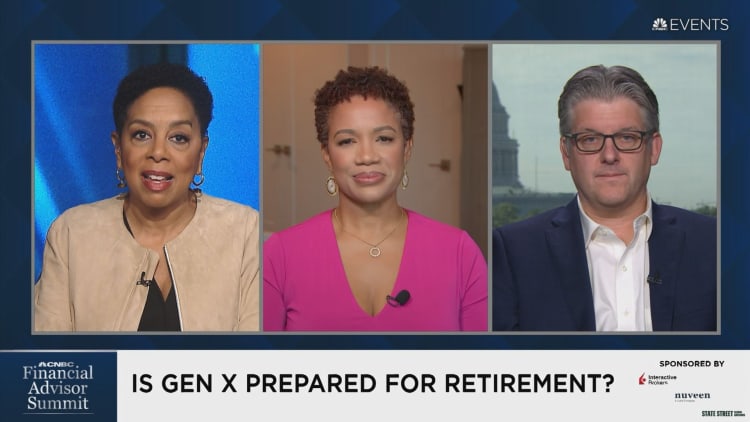Ippei Naoi | Moment | Getty Images
Generation X is known as the sandwich generation because they sit between having a combination of financial or emotional responsibility for adult children and aging parents — in addition to managing their own current lifestyle aspirations and securing their retirement future.
It’s a lot to deal with, and Gen X can struggle with juggling life and finances across multiple responsibilities.
But there are some steps Gen Xers can take to ease some of the stress and feel more financially secure:
- Align your life and money with purpose, giving your money assignments you connect with.
- Own your preferences for the life you want now and in your future retirement.
- Find confidence in planning your finances with a professional.
These steps give you the confidence to feel more secure and bring soul to your finances.
Finances of ‘the forgotten generation’
Gen Xers have earned other nicknames, such as latchkey kids and the forgotten generation.
Because people in this generation typically experienced both parents working while they were young, they became familiar with coming home to empty houses and learning resiliency in their parents’ absence, sometimes feeling forgotten.
Here’s the rub: Gen X is experiencing peak incomes — households age 44-54 (which encompasses much of this generation), have a median income of $101,500, the highest across all age groups, according to Statista.
But they also have average student loan debt of slightly more than $40,000, high debt in general and the least confidence in their retirement prospects. A 2023 Schroders report revealed 61% of Gen X don’t feel good about the prospects of achieving their dream retirement goals and 45% don’t have a retirement plan at all.

In a 2023 survey from Experian, Gen X respondents were most likely among the four adult generations to report experiencing financial trauma, which is emotional distress derived from objective and subjective traumatic events, past or present. Financial trauma shapes relationships with money that affect engagement, perspectives, and outcomes with finances.
About three-quarters (74%) of Gen X reported financial trauma, compared to 71% of millennials, 63% of boomers and 64% of Generation Z.
So how can Gen X feel more confident about their current and future finances?
While it may seem grim at times, first, give yourself grace. Second, Gen X must believe that they can secure their future selves without depriving their current selves. Smoothing the struggle of the juggle is knowing that with intentional financial life planning, the current and future lifestyle divide doesn’t have to be that way. It can be “and,” not “or.”
Here are some strategies that can help.
‘Catch up’ on your retirement savings
In more ways than one, there’s life after 50. For workers with access to a traditional or Roth 401(k) plan, in 2024, you can make employee-based contributions of $23,000. When you reach the age of 50 and older, you can make additional “catch-up” contributions of $7,500, bringing your total to $30,500.
To power-save, make additional after-tax contributions if your plan allows, which brings you up to as much as $69,000 for the year, or $76,500 with the catch-up.
Diversify your investment account balances
Employer-sponsored retirement accounts such as 401(k) plans or 403(b)s and individual retirement accounts have something in common: The word retirement is the account’s intended long-term goal. Many folks and advisors gripe that their money is “locked up” until the penalty-free withdrawal age of 59½.
For flexibility, consider partnering your tax-deferred investment accounts with taxable brokerage accounts that do not have an age penalty, only short- or long-term capital gains tax, with the preference being on the lower long-term tax rate.
Having account flexibility allows you to fund current needs and retirement simultaneously without income threshold restriction or penalty. Additionally, your assets in a taxable brokerage account receive a “step-up” in basis at death. This could lead to higher valuation and thus reduce capital gains tax for heirs.
Set financial boundaries with family
One key struggle of the sandwich generation juggle is permitting yourself to prioritize your self- and financial care while keeping aligned with your value system to care for your loved ones.
Sure, stay true to your cultures and values in wanting to provide financial help for your adult children and a community, cross-generational care approach to your aging parents. But you also need to be attentive to your own financial well-being.
It’s may be a cliche, but put your oxygen mask on first. Basically, find ways to secure your own issues before assisting others.
To that point, have life and money conversations with your adult children and aging parents about what help you can afford to offer.

Work with financial professionals
Being latchkey kids and often feeling forgotten contribute to Gen X’s natural skepticism, lacking trust until proven or earned.
While 65% of affluent millennials trust financial advisors, somewhat fewer, 58%, of affluent Gen X feel the same way, according to Investopedia’s Affluent Millennial Investing Survey. Proven or earned trust shows up in Northwestern Mutual’s 2023 Planning & Progress Study, where 50% of Gen X say they value financial advisors with expertise they don’t have, and 58% point to an advisor’s track record of experience.
With Gen X, it’s particularly important to be connected with and thus understood by their advisor, and offered sound financial advice they can use.
Don’t focus on seeking financial advice. Instead, unlock a relationship with a financial professional by seeking a referral from a trusted source. Or take a trust-but-verify approach by leaning into professionals’ social imprint, expertise and services.
— By Preston D. Cherry, a certified financial planner and the founder and president of Concurrent Financial Planning in Green Bay, Wisconsin. He is also a member of the CNBC Financial Advisor Council.







